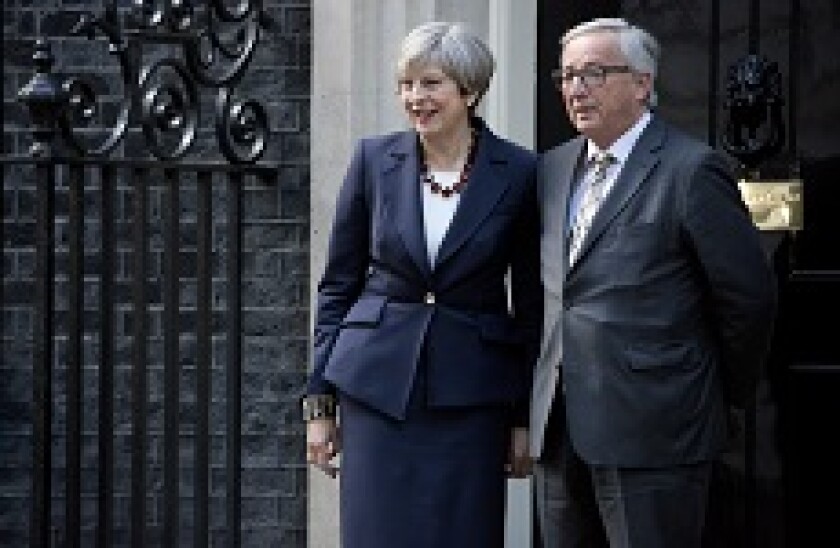The Professional and Business Services Council (PBSC) — which represents numerous sectors which including law, accountancy, consultancy, architecture, surveying and advertising services — wrote to Theresa May on Tuesday asking the prime minister to advocate for the UK services industry in negotiations with the EU.
The letter says that service providers need mutual recognition of qualifications and licences, regulatory frameworks and regulators.
The PBSC stresses the need for UK service providers to have the ability to fly-in and fly-out of countries across the EU 27, trade across Europe, share data and to have the ability to educate and recruit talent from the EU as well as the rest of the world.
The letter is signed by senior figures at the big four accounting firms, major law firms and numerous industry bodies including financial services advocacy group TheCityUK. The language is reminiscent of words spoken by many UK government ministers as they talk of a fantastical bespoke trade deal.
But it is becoming increasingly unlikely that the UK government will get any kind of bespoke trade deal with the EU.
An article in the Times this week reports that it is the view Theresa May’s most senior Brexit negotiator, Olly Robbins, that the UK will not be offered a bespoke agreement.
That reflects the mantra of the EU since the beginning of Brexit negotiations, which has always been that the UK must pick an already existing option on which to base its future relationship with the EU27.
Financial services professionals will already be aware of the problems with any deal based on “mutual recognition”.
Michel Barnier, the European Commission’s lead Brexit negotiator, already ruled out mutual recognition on financial services in April, given that it would undermine the single market, and said that the UK firms would have to access the single-market as a third country, like US companies do.
Under this scenario UK would likely accept a free trade deal in the same vein as Canada on goods, CETA, and third country equivalence on services.
The only conceivable way in which the UK could continue to maintain regulatory recognition would appear to be through the UK remaining in the single market.
This would likely be through membership of the European Economic Area, often called the “Norway Option”.
The EU has been characterised as intransient for adopting this approach, but there is a practical reason for the UK being forced to choose an existing arrangement.
Negotiations on the CETA trade agreement were launched in 2009 and took until August 2014 to be agreed. It took until October 2016 for the deal to actually be ratified and signed, given that it needed to be unanimously approved by every EU member states.
A bespoke deal would likely take far too long to put in place and could be easily vetoed.
This level of uncertainty would harm trade between the EU and UK, which is far more vital to each than trade between the EU and Canada, unless an unlimited transition period was put in place until a bespoke agreement was agreed and ratified, something neither side seems to want. Therefore service providers need to advocate for the UK to pick the least harmful existing option for their businesses.
Many people in the City would agree, at least in private, that the most preferable option for the UK would be continued membership of the European Single Market — and lobbyists for finance, law and professional services should not be afraid to publicly advocate for this.
The intervention of Airbus in the Brexit debate last month was a pivotal moment, in bringing Brexit-driven loss of jobs and businesses up the agenda, and if Airbus can do it, so should City businesses.
There would certainly be a backlash. Hard-line members of the pro-Brexit lobby will continue to make accusations of treachery and use profanities in private when discussing the concerns of British business. But it’s time to stop pandering to these ideologues.
Britain is set to leave the EU next March and the time is now for the financial services industry to step up and make their collective voice heard, rather than indulging in talk of a dream bespoke trade deal.

